Hong Kong protests refers to various protests, demonstrations, or marches that have taken place in Hong Kong. It may refer to:
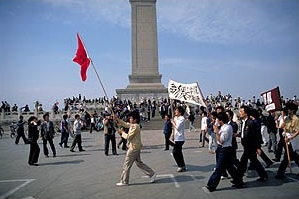
The Tiananmen Square protests, known in Chinese as the June Fourth Incident, were student-led demonstrations held in Tiananmen Square, Beijing during 1989. In what is known as the Tiananmen Square Massacre, or in Chinese the June Fourth Clearing or June Fourth Massacre, troops armed with assault rifles and accompanied by tanks fired at the demonstrators and those trying to block the military's advance into Tiananmen Square. The protests started on 15 April and were forcibly suppressed on 4 June when the government declared martial law and sent the People's Liberation Army to occupy parts of central Beijing. Estimates of the death toll vary from several hundred to several thousand, with thousands more wounded. The popular national movement inspired by the Beijing protests is sometimes called the '89 Democracy Movement or the Tiananmen Square Incident.

The Goddess of Democracy, also known as the Goddess of Democracy and Freedom, the Spirit of Democracy, and the Goddess of Liberty, was a 10-metre-tall (33 ft) statue created during the 1989 Tiananmen Square protests. The statue was constructed over four days out of foam and papier-mâché over a metal armature and was unveiled and erected on Tiananmen Square on May 30 1989. The constructors decided to make the statue as large as possible to try to dissuade the government from dismantling it: the government would either have to destroy the statue—an action which would potentially fuel further criticism of its policies—or leave it standing. Nevertheless, the statue was destroyed on June 4, 1989, by soldiers clearing the protesters from Tiananmen square. Since its destruction, numerous replicas and memorials have been erected around the world, including in Hong Kong, San Francisco, Washington, D.C., and Vancouver.

Jasper Tsang Yok-sing is a Hong Kong politician. He is the founding member of the largest pro-Beijing party the Democratic Alliance for the Betterment and Progress of Hong Kong (DAB) from 1992 to 2003 and the 2nd President of the Legislative Council from 2008 to 2016.
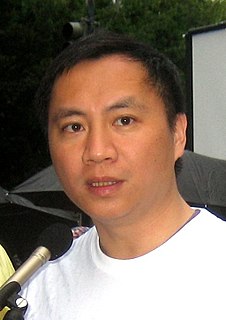
Wang Dan is a leader of the Chinese democracy movement and was one of the most visible student leaders in the Tiananmen Square protests of 1989. He holds a Ph.D. in history from Harvard University, and from August 2009 to February 2010, Wang taught cross-strait history at Taiwan's National Chengchi University, as a visiting scholar. He then taught at National Tsing Hua University until 2015.

The 1967 Hong Kong riots were large-scale anti-government riots that occurred in Hong Kong during British colonial rule. Beginning as a minor labour dispute, the demonstrations eventually escalated into protests against the British colonial government. The protests were also partially inspired by riots that had occurred just a few months prior in Portuguese Macau, known as the 12-3 incident, which were ultimately much more successful on the side of the protesters.

The Hong Kong Alliance in Support of Patriotic Democratic Movements of China was a pro-democracy organisation that was established on 21 May 1989 in the then British colony of Hong Kong during the 1989 Tiananmen Square protests and massacre in Beijing. After the 4 June massacre, the organisation main goals were the rehabilitation of the democracy movement and the accountability for the massacre. The main activities the organisation held were the annual memorials and commemorations, of which the candlelight vigil in Victoria Park was the most attended, reported and discussed event each year. Due to its stance, the Central government in Beijing considers the organisation subversive.

The Hong Kong 1 July protests was an annual protest rally originally held by the Civil Human Rights Front from the day of handover in 1997 on the HKSAR establishment day. However, it was not until 2003 that the march drew large public attention by opposing the legislation of Basic Law Article 23. The 2003 protest, with 200,000 marchers, was the second-largest protest seen in Hong Kong since the 1997 handover.
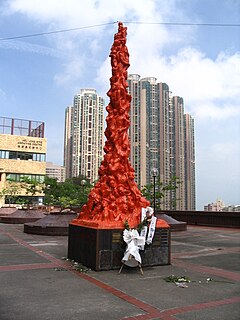
Pillar of Shame is a series of sculptures by Danish artist Jens Galschiøt memorialising the loss of life during specific events or caused by specific circumstances in history. Each sculpture is an eight metres (26 ft) tall statue of bronze, copper or concrete.

Xiong Yan is a Chinese-American human rights activist, military officer, and Protestant chaplain. He was a dissident involved in 1989 Tiananmen Square protests. Xiong Yan studied at Peking University Law School from 1986–1989. He came to the United States of America as a political refugee in 1992, and later became a chaplain in U.S. Army, serving in Iraq. Xiong Yan is the author of three books, and has earned six degrees. He is running for Congress in New York's 10th congressional district, and his campaign has reportedly been attacked by agents of Communist China's Ministry of State Security.

The 20th anniversary of the 1989 Tiananmen Square protests and massacre (20周年六四遊行) was a series of rallies that took place in late May to early June 2009 to commemorate the 20th anniversary of the 1989 Tiananmen Square protests and massacre, during which the Chinese government sent troops to suppress the pro-democracy movement. While the anniversary is remembered around the world; the event is heavily censored on Chinese soil, particularly in Mainland China. Events which mark it only take place in Hong Kong, and in Macao to a much lesser extent.
Operation Yellowbird, or Operation Siskin, was a Hong Kong-based operation to help the Chinese dissidents who participated in the Tiananmen Square protests of 1989 to escape arrest by the Chinese government by facilitating their departure overseas via Hong Kong. Western intelligence agencies such as Britain's Secret Intelligence Service and the U.S. Central Intelligence Agency (CIA) were involved in the operations. Other contributors included politicians, celebrities, business people and triad members from Hong Kong—forming the "unlikely" alliance which sustained the operation for most of its duration.
The 1989 Tiananmen Square protests and massacre were the first of their type shown in detail on Western television. The Chinese government's response was denounced, particularly by Western governments and media. Criticism came from both Western and Eastern Europe, North America, Australia and some east Asian and Latin American countries. Notably, many Asian countries remained silent throughout the protests; the government of India responded to the massacre by ordering the state television to pare down the coverage to the barest minimum, so as not to jeopardize a thawing in relations with China, and to offer political empathy for the events. North Korea, Cuba, Czechoslovakia, and East Germany, among others, supported the Chinese government and denounced the protests. Overseas Chinese students demonstrated in many cities in Europe, America, the Middle East, and Asia against the Chinese government.

Örkesh Dölet, commonly known as Wu'erkaixi, is a political commentator known for his leading role during the Tiananmen protests of 1989.
The 24th anniversary of Tiananmen Square protests of 1989 took place in China and internationally around 4 June 2013. The protests commemorated victims of the Chinese Communist Party crackdown on the Tiananmen Square protests of 1989. Activities included the state of alert within mainland China, and the traditional marches and candlelight vigils that took place in Hong Kong and Macau on 4 June 2013 which have taken place every year prior to that since 1990. The two former colonies are the only places on Chinese soil where the 1989 crushing of China's pro-democracy movement can be commemorated.

The June 4th Museum, organised by the Hong Kong Alliance in Support of Patriotic Democratic Movements in China, is a museum commemorating the 1989 Tiananmen Square protests and massacre that occurred in Beijing, China.
The 25th anniversary of Tiananmen Square protests of 1989 was principally events that occurred in China and elsewhere on and leading up to 4 June 2014—to commemorate the Chinese Communist Party's crackdown on the Tiananmen Square protests of 1989.

Voice of Loving Hong Kong is a pro-Beijing camp organisation and pressure group. Created by businessman and activist Patrick Ko, initially as a Facebook page, its stated aim is to show solidarity with, and support for the CY Leung administration. It organises rallies and counter-demonstrations in opposition to anti-government and anti-Beijing demonstrations.
The catalyst for the birth of the Pro-Democracy Movement was the death of Hu Yaobang on April 15, 1989. Beginning in late April until June 3 large crowds gathered in Tiananmen Square. During this period a significant amount of money was donated to the student organizations, it was spent on providing food, water and other supplies required to sustain the many thousands of protesters who occupied the Square.
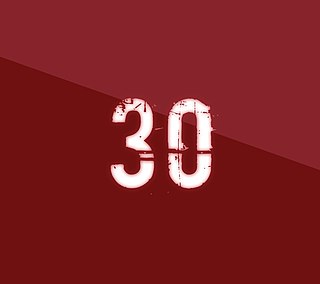
The 30th anniversary of Tiananmen Square protests of 1989 was principally events that occurred in China and elsewhere on 4 June 2019 - to commemorate the Chinese Communist Party's crackdown on the Tiananmen Square protests of 1989 in which hundreds of people were killed.
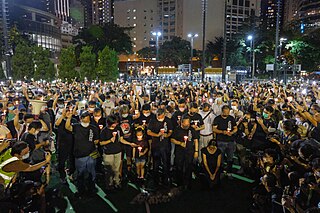
The 31st anniversary of Tiananmen Square protests of 1989 was principally events that occurred in China and elsewhere on and leading up to 4 June 2020 – to commemorate the 1989 Tiananmen Square protests and massacre, in which thousands of people are widely believed to have been killed.